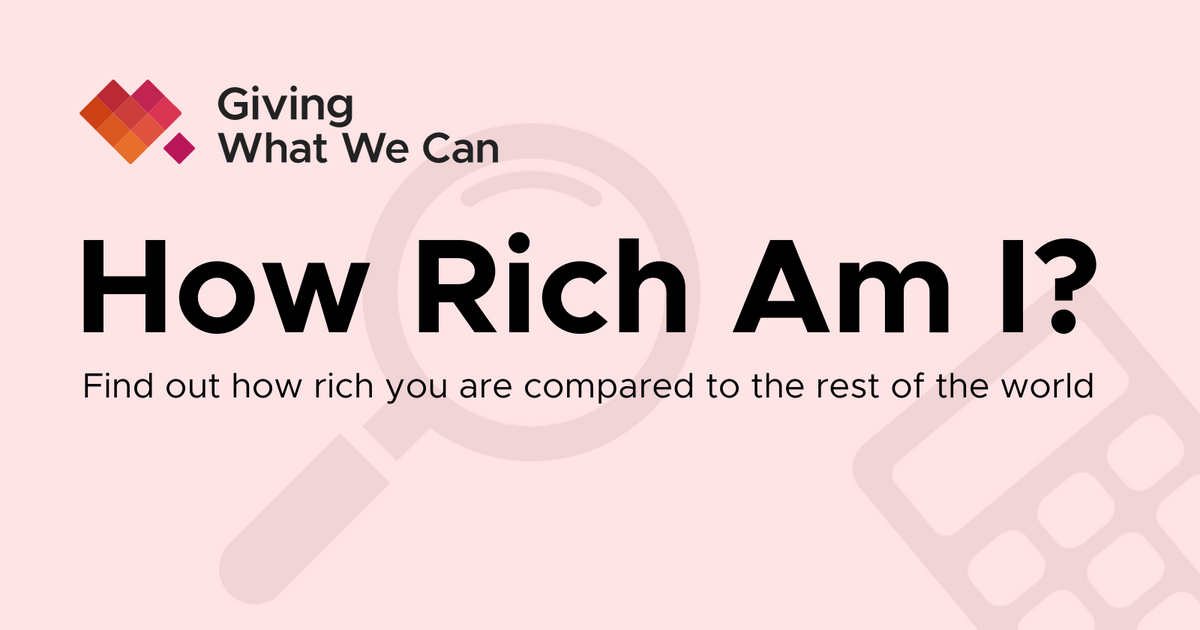Again, you're only looking at material benefits.Human rights, civil rights, people of color....women....
Which decade do you think other than those in privilege would prefer?
That's not what the OP is about.
Again, you're only looking at material benefits.Human rights, civil rights, people of color....women....
Which decade do you think other than those in privilege would prefer?
Global perspective of privilege?Are you not referring to "the privileged", relatively speaking from a global perspective?
That's my point .. you are speaking from your own perspective..Here in the US I have privilege as a white hetero male cis gender human, differing locations in the globe that may not be the same.

Out of curiosity I plugged in a dollar amount for theoretical income, I’m in the US, that for a family of 2 adults and 2 children is so low that survival without help from an outside source would be virtually impossible. The website tool, however, announced how wealthy I am in comparison to most of the world. Without taking into consideration other factors, such as what it costs to live where one lives, the tool is of no consequence.If you are lucky enough to earn more than £10,000 per year in the UK, that puts you amongst the top 16%, of the richest people on Earth. Your income is more than 4 times the global median. The median average salary for all workers in the UK is £27,756.
If you are interested, you can see how rich you are, compared to the rest of the world, link below…..
Countries vary in income and amenities? Shocker!That's my point .. you are speaking from your own perspective..
Many others in the world might not feel that "these days" are better than the past.
..and hence for them, the world is not heading in the right direction at all !
No .. that is not true.Out of curiosity I plugged in a dollar amount for theoretical income, I’m in the US, that for a family of 2 adults and 2 children is so low that survival without help from an outside source would be virtually impossible. The website tool, however, announced how wealthy I am in comparison to most of the world. Without taking into consideration other factors, such as what it costs to live where one lives, the tool is of no consequence.
As @Thomas says .. you seem to only see "progress" in terms of $'s.By most any metric other than mythological we have progressed over the millenia and continue to do so..
But if you lived in a shack in the woods in the US, with no running water, no electric, gas or wifi, and grew your own food, you could live on less than you are living on now. This is the lifestyle thrust on hundreds of millions of people, who go to bed hungry at night.Out of curiosity I plugged in a dollar amount for theoretical income, I’m in the US, that for a family of 2 adults and 2 children is so low that survival without help from an outside source would be virtually impossible.
But mean income is not the same thing as GDP per capita, and GDP per capita was not within the purview of the website tool.No .. that is not true.
GDP per capita, is a good measure of what goods can be bought by an individual.
Imports / exports .. come on! You know..
I don’t think you understand what I wrote. I didn’t deny the horrible conditions that all too many people daily have to live through and deal with. I didn’t deny that love and justice demand that we each do our part to alleviate and correct those conditions. I simply noted that the tool on the website you directed us to was, to be charitable, inadequate.But if you lived in a shack in the woods in the US, with no running water, no electric, gas or wifi, and grew your own food, you could live on less than you are living on now. This is the lifestyle thrust on hundreds of millions of people, who go to bed hungry at night.
Maybe .. but not that bad..I simply noted that the tool on the website you directed us to was, to be charitable, inadequate.
Bahai' prognostications are therefore admissible, nor in fact are they relevant to a discussion of origins, not ends.
I think it is more a typo error. I'm sure @Thomas meant to type 'inadmissable'?Therin lies a grave error of reasoning.
The golden rule in Christianity is to love God, and to love all our neighbours as we love ourselves. This is sacrificial, we put God first, our neighbours second and ourself last. If we truly wanted to lift our brothers and sisters out of grinding poverty and starvation, we can only do this by giving up some of our own resources.If we were evolving somehow into 'better people', then laws like the Golden Rule or the Ten Commandments would be no more than notes in history books ... but they aren't.
and (in a comment):you say: "the Christian myth of history as a redemptive drama was not abandoned, but renewed in another guise. A story of redemption was replaced by one of progress through the collective efforts of humanity.
